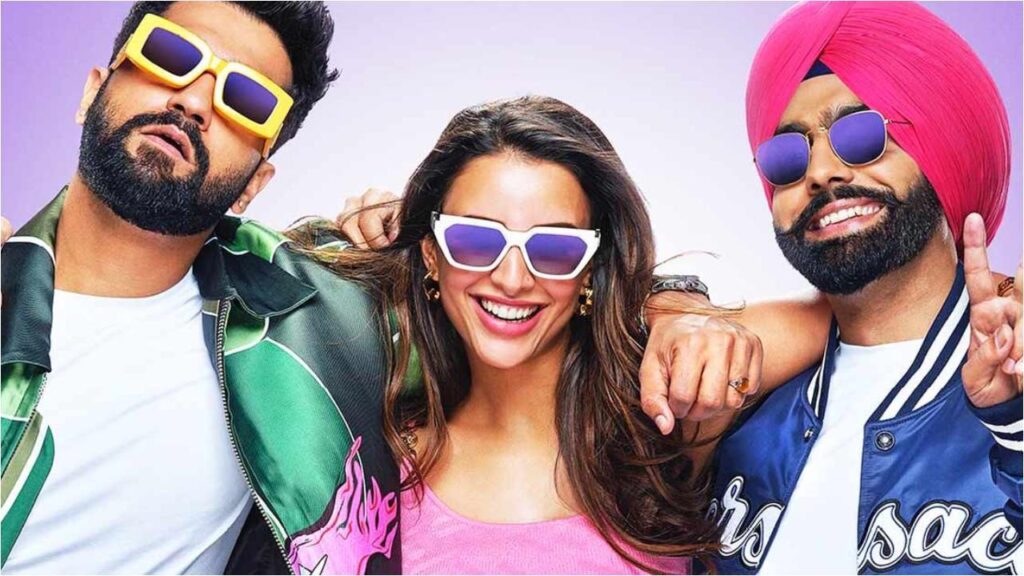In Anand Tiwari’s Bad Newz, chaos erupts when an ambitious and independent woman discovers that she is impregnated with twins fathered by two different men. The ensuing crisis from this highly unique situation should have added some fresh flavor to the story. Sadly, it stagnates instead. The misdirected blend of mayhem and attempted charm is neither sprinkled with heartwarming moments nor any genuinely hilarious ones.
Saloni Bagga (Triptii Dimri) works as a chef in a gourmet restaurant and aspires to win the Meraki star, a global recognition for culinary skill. Persuaded by her mother, she attends a function where she meets Akhil Chadha (Vicky Kaushal), the owner of a ‘chap restaurant’, and sparks fly between them. They start dating and soon get married. However, within six months, Saloni realizes that Akhil is not a perfect match for her. He also becomes the reason for her not winning the much-coveted recognition. She divorces him and joins a new hotel in Mussoorie, where she meets with the owner, the refined and well-mannered Gurbir Pannu (Ammy Virk). A tender relationship develops between them. One night, on a drunken spree, after realizing that Akhil has moved on, she makes out with Gurbir. Later that night, when she returns to her room, she is startled to discover a repentant Akhil hiding in the cupboard. She makes out with him too. Six months later, she discovers that she is pregnant from heteropaternal superfecundation, and the twins have different biological fathers, Akhil and Gurbir.
On the surface, Bad Newz touches upon the topic that a woman should have the agency to choose who she wants to father her child without judging her for her so-called promiscuous behavior. It also looks at the complications that come with motherhood and our perception of masculinity. But as the narrative progresses, it seems to show absolutely no interest in deeply exploring any of these themes as it simply presents them as a carrot-hanging bait and moves on. The weak and often juvenile screenplay by Ishita Moitra and Tarun Dudeja (with additional contributions from Sumit Purohit), struggles to ground the film comically as well as emotionally. As a result, the stakes are never raised enough for us to care about the characters. Rather than presenting a coherent plot, it feels like the filmmakers threw everything at the wall to see what would stick.
The makers attempt to compensate by moving the film at breakneck speed. Within the first twenty minutes itself, we are bombarded with the introduction of Dimri and Kaushal, their whirlwind romance and subsequent honeymoon with two songs thrown in. The development of their love story and subsequent divorce is so rushed that we fail to connect at any level with their loss. Each scene of the film is executed with such over-the-top humour that it neither tickles our funny bone nor helps us empathize with the characters. Logic is thrown out of the window. A character named Sukhi Mama (Khayali Ram), a detective and Akhil’s maternal uncle, appears out of nowhere. It’s only in the final moments, when a complication arises during Saloni’s delivery, that the film slows down enough to try and heighten its emotional impact but it is too little and much too late.
The three principal characters are associated with the business of food. But it fails to blend convincingly within the plot, being reduced to a profession to give the characters and little else. Though admittedly, there is a little subplot in the film involving Gurbir’s ex-girlfriend, a vegetarian, and how their relationship could not proceed because of Gurbir’s family’s love for chicken. This could have been a strong comment on the current state of our society but instead is treated as a token element. Even the meta-jokes and references to Hindi films like Dilwale Dulhania Le Jayenge (1995) and Mohabbatein (2000), amongst others, fall flat.
With films like Laila Majnu (2018), Bulbbul (2020), and Qala (2022), Dimri has proven her mettle as an actress. Even in her brief appearance in Animal (2023), she manages to leave a lasting impression. But here, it all goes wrong. On paper, it’s a brave and bold character but what appears on screen is an OTT woman with everything from her smile to the emotional upheaval coursing within her, expressed through a high level of exaggeration to make sure we get it. Kaushal brings all the zest of a young Punjabi munda but obviously acts out the flamboyance of the character rather than letting it flow naturally. Virk gives a spirited performance even if he is defeated by having to play a unidimensional character. Sheeba Chaddha as Akhil’s overbearing mother is stereotyped while Neha Dhupia is lackluster.
Debojeet Ray’s cinematography is more about making the frames look colorful and the characters good-looking. The editing by Shan Mohammed tries desperately hard to maintain consistency in the rhythm and flow of the film but is defeated by the lack of cohesiveness in the writing. The sound design is dominated by Amar Mohile’s jarring background score and except for Tauba Tauba, the rest of the songs are underwhelming to say the least.
It’s literally bad news for Hindi cinema if it continues churning out such mediocrity in the name of comedy. To say that it is as unpalatable as any dish gone wrong is an understatement.
Hindi, Comedy, Color


